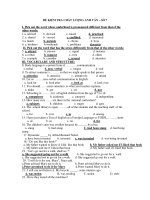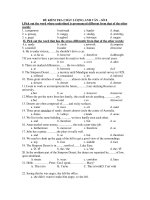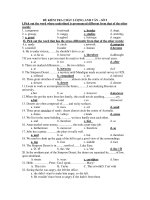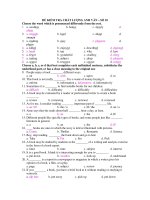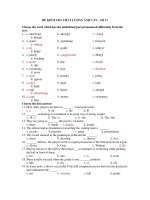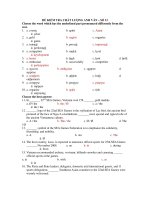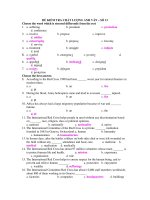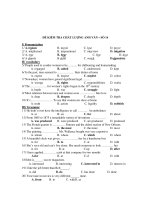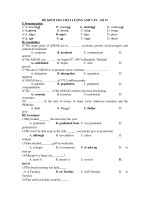ĐỀ THI KIỂM TRA CHẤT LƯỢNG ANH VĂN KHỐI 12 - ĐỀ 5 potx
Bạn đang xem bản rút gọn của tài liệu. Xem và tải ngay bản đầy đủ của tài liệu tại đây (71.85 KB, 4 trang )
ĐỀ THI KIỂM TRA CHẤT LƯỢNG ANH VĂN KHỐI 12 - ĐỀ 5
A. VOCABULARY :
I. Fill in the blanks with the appropriate word or phrase given bellow :
(the second half, convenient, reminded, correspondent)
1. It’s for tourists to take a taxi to their hotel.
2. The second part of a football match is
3. The man who writes reports and articles for a newspaper is a
4. The story him of his early years in his native village.
II. Write the verbs from the following nouns :
1. symbol : 2. drama :
3. apology : 4. critic : 5.
emphasis
III. Write synonym of the following words :
1. to fascinate = 2. to take part in =
3. tube = 4. moreover = 5. beside =
IV. Write opposite of the following words :
1. to set a record 2. fortunately
3. comfortable 4. debtor 5. expensive
B. GRAMMAR :
I. Rewrite the sentences as directed in parentheses :
1. He asked his brother to mail the letter yesterday. (use “had” instead of “asked”).
2. You had better tell me about yourself. (change into the negative form).
3. Lan’s mother gave her a gift. Lan’s mother said she wanted to reward Lan for her
good marks.(V
-ing
)
4. She is very old. She can not work hard.(too to)
5. I can’t go with you because I am very busy.(so that)
6. Mary comes from a good family. She is a clever girl.(not only but also)
7. The old lady asked the boy to help her to carry a heavy bag.(causative active
form)
8. I am so busy that I have no time to go with you.(too to)
9. We are advised not to go out alone.(change into active voice)
10. He worried because of his father’s bad health.(make + O + V )
II. Supply the correct verbs in the parentheses :
1. The car isn’t here today because my friend (use) it.
2. We (listen) to the radio when it suddenly stopped
working.
3. She (visit) Europe many times since she (come) there
three months ago.
4. How long (you wait) for me ?- I (wait)
for you for two hours.
5. I (not send) the parcel until I hear from you.
III. correct the grammatical mistakes :
1. They will go until we shall come.
2. I enjoy to listen to music every night.
3. His father is used to taking him to the circus when the family lived in the city.
4. The car stopped to run after the heavy rain last night.
5. When has she begun learning French.
C. READING PASSAGE :
Sometimes we say that someone we know is “a square peg in a round hole”. This
simply means that the person we are talking about is not suited for the job he is doing.
He maybe a book keeper who really wants to be an actor or a mechanic.
Unfortunately, many people in the world are “square pegs”, they are not doing the
kind of work they should be doing for one reason or another. As a result, they
probably are not doing a very good job and certainly they are not happy.
Choosing the right career is very important. Most of us spend a great part of our
lives at our jobs. For that reasons we should try to find out what our talents are and
how we can use them. We can do this through aptitude tests, interviews with
specialists, and study books in our field of interests. There are many career open to
each of us. Perhaps we like science. Then we might prepare ourselves to be chemists,
physicists, or biologists. May be our interests take us into the business world and such
work as accounting, personnel management or public relations. Many people find
their place in government service. Teaching newspaper work, medicine, engineering-
these and many other fields offer fascinating careers to persons with talent and
training.
* ANSWER THE FOLLOWING QUESTIONS :
1. Why is it important to find the right career ?
2. Name three ways that we can find the right career ?
3. What are some of the career found in the scientific world ?
* TRANSLATE THE WHOLE PASSAGE INTO VIETNAMESE :
D. READING THE PASSAGE AND CHOOSE THE CORRECT WORDS FOR
THESE BLANKS :
Many hundreds years (1) there were many villages and few
towns in England. The villagers liked to go into the forests and the fields when the spring
came. On first Sunday of May they usually took a tree back (2) them
and put it (3) the village. The children danced around it and the men
and the women (4) games around it. Late the international working
class made the first of May the day of solidarity. The first May Day
(5) in England in 1890, when the workers decided to fight for an eight-hour working day
and an end to the very long hours that they worked. In London the workers
(6) from all places to a meeting in Hyde Park. This demonstrations
(7) their solidarity and unity. After that, May Day in England was
usually celebrated on the Sunday nearest to the First day of the month. There
(8) many large May Day demonstrations. The working people
showed on those days their solidarity with the progressive people in other counties.
1. ago / before / ahead / in front of. 5. celebrated / considered /
born / organized.
2. follow / with / by / for. 6. participated / marched /
promoted / symbolized.
3. between / among / in the centre of / in the middle of. 7. marched /
prepared / showed / hold.
4. joined / entered / took place / took part in. 8. are / were / has
been / have been.
* ANSWER THE FOLLOWING QUESTIONS :
1. What did the English people do on the first Sunday of May ?
2. When was the first May Day celebrated in England ?
3. Where did the workers in London hold a meeting ?
4. What did the working people show on those days ?
* TRANSLATE THE WHOLE PASSAGE INTO VIETNAMESE :

